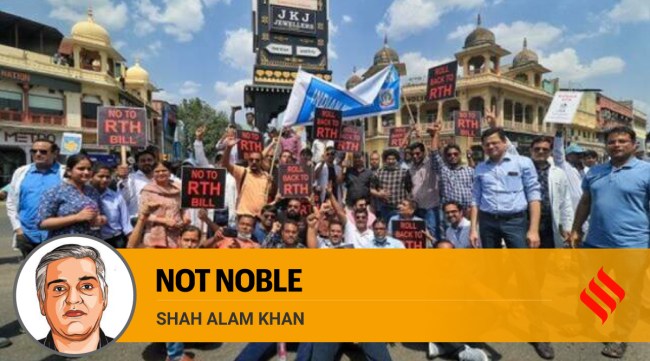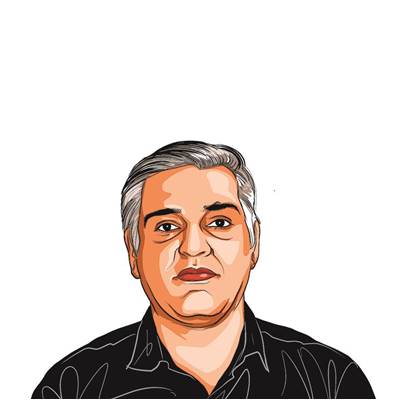Opinion Shah Alam Khan writes: Doctors must embrace Right to Health Bill, not protest against it
Anxiety and frustration of the doctors in Rajasthan over a patient-friendly bill shows how far the physician is from the people
 "The main grudge of the protesting doctors of Rajasthan is the clause in the bill according to which any resident of the state will have the right to emergency treatment and care without prepayment at all hospitals and healthcare centres," writes Shah Alam Khan. (PTI)
"The main grudge of the protesting doctors of Rajasthan is the clause in the bill according to which any resident of the state will have the right to emergency treatment and care without prepayment at all hospitals and healthcare centres," writes Shah Alam Khan. (PTI) On March 21, Rajasthan became the first state in India to pass the Right to Health (RTH) bill. The bill allows free access to out-patient and inpatient services in all government and selected private hospitals in the state. Ever since the bill was passed, the medical fraternity has been up in arms against it. In a nutshell, the majority of doctors feel that the RTH bill is an assault on their “business model”. This needs to be seen in context of a nation reeling under the broken moral compass across various spheres of life be it political, social or professional and not merely limited to health care providers.
Before we understand the complexities of the protest against the RTH bill, it is essential to emphasise that Rajasthan is not a “healthy” state by any standards. In 2022, in a report titled “Healthy states, progressive India”, the NITI Aayog, World Bank and the Union Ministry of Health and Family Welfare, had placed Rajasthan at 16th position among 19 big states. As per the National Family Health Survey -5 (2019-21), the infant mortality rate and the neonatal mortality rate in the state are 30.3 per 1,000 live births and 20.2 per 1,000 live births respectively. Such high rates of childhood mortality speak poorly of the healthcare infrastructure of the state. It is one of the states with highest levels of nutritional anaemia among women and children. The doctor-population ratio of the state is at an astoundingly low level of five doctors per 10,000 population (in comparison, it is 21 per 10,000 population in Jammu and Kashmir). With such a dismal health picture, Rajasthan was the ideal state to formulate and implement the RTH bill.
The protest of the state’s medical fraternity against the bill is extraordinary. We live in an era where the invincible power of capitalism has triggered a cascade of health crises. Gone are the days of medicine being the noblest of all professions. As per official data, more than 78 per cent of healthcare in India is now delivered by private players. The private physician has thus nearly completely replaced the conventional government doctor and it is this private physician who is most unhappy with the RTH bill in Rajasthan. The Indian Medical Association (IMA) has threatened to organise a national level protest against the RTH bill in days to come. It is a known fact that most of the office bearers of IMA are private practitioners and the election to various posts of the organisation are keenly fought on the basis of regional, political and monetary clout. It is important to mention here that according to the information available across the web, and in contrast to what the IMA officials are saying, the RTH bill of Rajasthan was formulated after a series oRasaaf meetings between the doctors and government officials. The bill underwent significant modifications from its original form which was introduced in the assembly in September 2022. It is thus not a bill designed without keeping the stakeholders in the loop.
The main grudge of the protesting doctors of Rajasthan is the clause in the bill according to which any resident of the state will have the right to emergency treatment and care without prepayment at all hospitals and healthcare centres. This of course upsets the “business model” on which most private healthcare set ups work. The anxiety of the doctors about this clause is twofold: First, who decides what can be classified as a medical emergency, and second, the bureaucratic and political control and arm twisting when it comes to admitting or reimbursing payment for these patients. Both the apprehensions are justified but are not enough to be grounds to oppose a unique, first of its kind initiative by any Indian state in safeguarding the health of its citizens. The doctors should have appeared to be siding with the patient in a matter which is so clearly benefiting them.
Both the above-mentioned issues are not problems due to the RTH bill but rather a problem arising out of the doctors’ mistrust of the system. Unfortunately, the privileged Indian doctor is hand-in-glove with the same system when it comes to crucial issues. How many times have we seen the doctors of Rajasthan speak up against communalism, caste atrocities, police brutalities or erosive political ideology? The protest of the doctors shows their naivety in failing to embrace a historic moment in patient care in this country.
The anxiety and frustration of the doctors of Rajasthan over a just, patient-friendly bill shows how far the Indian physician is from the common man. Many of my friends in private practice as well as young physicians ask, is it a crime to earn money? No, it isn’t, but the difference between earning and extracting money is so subtle in the practice of modern medicine that it isn’t too difficult to cross the line.
Rajasthan’s RTH is a legal entitlement for the patient which will hopefully prevent many doctors from crossing that line. It may be interesting to note that Rajasthan also has one of the highest incidences of violence against healthcare professionals in the country. Violence against healthcare professionals is multifactorial but at the heart of this violence lies the deep mistrust of the patient or his kin of the system in general and the doctor in particular. Embracing a patient friendly bill would have been an opportunity for the doctors of Rajasthan to douse this mistrust to some extent.
The physician is in direct contact with people. Society and the physician are mirrors to each other. If the physician of today has to look good in the mirror, he/she has to help society look good. The easiest way to make society look good is to bring equality and justice and this may be at the cost of the physician’s ability to earn money. We doctors should not seem to be gathered under the canopy of organisational privileges. Rather, we should look like men working under the sun, hand-in-hand with the poor and the have-nots. Even if we don’t look rich, we should at least look kind.
The writer is Professor, Department of Orthopaedics, All India Institute of Medical Sciences. Views are personal




